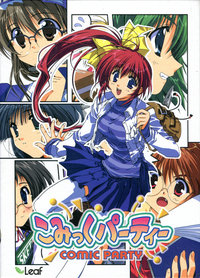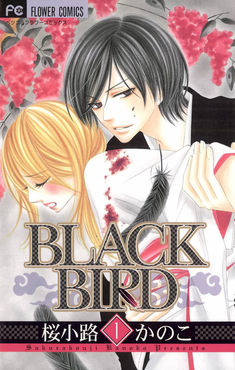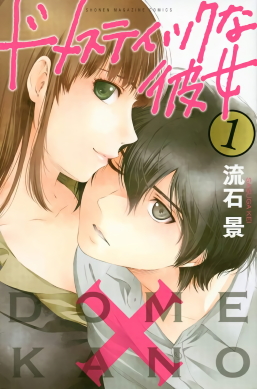- NA: Kodansha USA
Tokyopop (former)
- Sae Kashiwagi (柏木 さえ, Kashiwagi Sae)
- Voiced by: Megumi Nasu(Japanese); Cherami Leigh (English)
- Played by: Mei Nagano (Live Action 2017)
- The main antagonist who does everything to ruin Momo's life. Sae's fair features such as her pale skin and dark hair serve as a contrast for Momo; her "innocent" appearance belies her scheming, mischievous, trouble making nature. She is the one who spreads malicious gossip about Momo; something Momo knows, but has trouble dealing with, as people are more apt to believe in Sae than the 'airheaded ganguro girl' to the point that Toji believed Sae over Momo (who was currently his girlfriend). She often uses the gossip to make people dislike Momo, as a result of her own jealousy and insecurity. She spreads rumors that she is dating Toji, and that Momo is trying to steal him from her when it is actually the other way around. She really is mean and doesn't care for Momo and isn't her "real" friend. All she wants is popularity in school, to humiliate Momo, and to get Toji all for herself. She will stop at nothing to complete this task. Later, she dates a male model named Jigoro and in the end exploits him to help break up Toji and Momo, the nastiest scheme she has ever plotted. She begins to repent after she falls in love with Ryo and understands the hurtful feeling that she caused Momo, when Ryo seemingly gets her pregnant (it later turns out to be a medical condition that simulates pregnancy) and subsequently abandons her.
- The entire reason Sae ruins Momo's life by lying, is that fact she can't accept someone doesn't have secrets and is genuinely kind; due to suffering betrayal of that kind in her childhood.
- Kairi Okayasu (岡安 浬, Okayasu Kairi)
- Voiced by: Kenichi Suzumura (Japanese); Orion Pitts (English)
- Played by: Kei Inoo (Live Action 2017)
- A popular and carefree classmate of Momo's. Sae goes after him after Momo lies that she likes him to protect her and Toji's relationship, but he is the only boy to see straight through Sae for what she really is. He has the reputation of being a playboy, something he is not exactly proud of. He thought that Momo was the one who once gave him CPR when he had nearly drowned at the beach when they were younger; only to later find out he had been saved by the local male lifeguard. His interest in her is renewed when Sae spreads rumors about them being a couple; he adds to this by claiming he has kissed Momo. When Momo is upset by his rumor, he tries to make the rumor true by kissing her unexpectedly in the beginning of the series.
- After the two start dating, his insecurities about relationships are revealed to stem from his unrequited love for Misao, the school nurse and Kairi's former tutor. However, after he confesses and is shot down by her, he actually feels relieved and confident to pursue his relationship with Momo. He begins fighting over her with Toji and in the end they get back together.
The English-language manga uses the non standard romanization "Kiley Okayasu". [8] Other groups, such as FUNimation, Kodansha Japan, and non-English language publishers, use "Kairi". [9] The English version of Peach Girl NEXT uses Kairi. [10]
- Kazuya "Toji" Tojigamori (東寺ヶ森 一矢, Tōjigamori Kazuya, とーじ Tōji)
- Voiced by: Hidenobu Kiuchi (Japanese); Robert McCollum (English)
- Played by: Mackenyu (Live Action 2017)
A boy who has been Momo's crush since junior high school although she never then confessed to him due to a friend saying he "doesn't like girls with tan skin". He overhears Momo confess her love for him to Kairi and then eventually dates Momo but Sae wants him for herself. He has a good heart, but tends to be hard headed and oblivious to what is in front of him, believing what Sae says over what Momo says, much to the frustration of Momo. Sae later blackmails Toji into dating her using pictures of Momo and Jigoro in a hotel bed together. He then breaks up with Momo. After this Momo starts dating Kairi.
The Tokyopop manga renders his family name as "Toujikamori".
- Misao Aki (安芸 操, Aki Misao)
- Voiced by: Mami Kingetsu (Japanese); Colleen Clinkenbeard (English)
- Played by: Yuika Motokariya (Live Action 2017)
The school nurse and a big sister figure for Momo. Misao was once Kairi's tutor and crush, and an old flame of Ryo's. Although she dated and broke up with him, she still loves him.
- Ryo Okayasu (岡安 涼, Okayasu Ryō)
- Voiced by: Sho Hayami (Japanese); Charles Baker (English)
- Played by: Kensei Mikami (Live Action 2017)
- Kairi's older brother who works in the video game industry. He serves as a male counterpart to Sae, only he is significantly more dangerous. Ryo is in love with Misao, and dated her briefly, but Misao broke up with him because of his cold and manipulating attitude which is revealed when he smacks Sae after hurting Misao.
- Sae meets him and quickly falls for him because of their obvious similarities, though Ryo barely takes the relationship seriously and treats Sae poorly. When Sae tells him she is pregnant with his child he gives her money. Ryo is quite touched by Sae when she tells him she wants to make a family with him that will love him. After they find out Sae had a false pregnancy, the two split. However, Ryo stills feels happy about what Sae told him, and seems to be interested in having kids.
- Goro Ooji (大路 吾郎, Ōji Gorō)
- Voiced by: Junichi Suwabe (Japanese); Viktor Walker (English)
- Played by: Daisuke Kikuta (Live Action 2017)
- He is called Jigoro (ジゴロー, Jigorō) and is a male model who is smitten with Sae and unaware of her true personality. She uses him in her schemes against Momo.
- Morika
- Voiced by: Miho Yamada (Japanese); Kira Vincent-Davis (English)
- A young woman who once dated both Okayasu brothers, Morika has a grudge against Ryo and tries to use Kairi against him. Morika hires some thugs to beat up Ryo as revenge for using her.
Media
Manga
After the run of the original series, a sequel titled Peach Girl: Sae's Story (裏 ピーチガール, Ura Peach Girl, lit. Reverse Peach Girl) was published in Japan by Kodansha in Bessatsu Friend from 2004 to 2006 and collected in three tankōbon volumes. It is told from the point of view of Sae, the main antagonist of Peach Girl. It is licensed in North America by Tokyopop.
Anime
| Peach Girl | |
 First tankōbon volume cover | |
| ピーチガール (Pīchi Gāru) | |
|---|---|
| Genre | Romantic comedy drama |
| Magazine | Bessatsu Friend |
| English magazine | Smile [1] |
| Demographic | Shōjo |
| Original run | September 13, 1997 – December 13, 2003 |
| Volumes | 18 |
| No. | Title | Directed by | Written by | Original air date |
|---|---|---|---|---|
| 1 | "Love Hurricane!" Transliteration: "Rabu Harikēn!" (Japanese: ラブ・ハリケーン!) | Hiroshi Ishiodori | Hiroko Tokita | January 8, 2005 |
| 2 | "Love Trap Kiss!" Transliteration: "Torappu Kisu!" (Japanese: トラップ・キス!) | Makoto Fuchigami | Yuki Enatsu | January 15, 2005 |
| 3 | "How Far Will You Go, Super Sae?" Transliteration: "Koko Made Yaru!? Sūpā Sae" (Japanese: ここまでやる!? スーパーさえ) | Toshihiro Ishikawa | Miho Maruo | January 22, 2005 |
| 4 | "The Catastrophe" Transliteration: "Kiyoku Tadashii Hakyō Sengen" (Japanese: 清く正しい破局宣言) | Masami Furukawa | Natsuko Takahashi | January 29, 2005 |
| 5 | "The Swim Meet From Hell" Transliteration: "Shakunetsu Dotō no Suiei Taikai" (Japanese: 灼熱怒涛の水泳大会) | Hiromichi Matano | Reiko Yoshida | February 5, 2005 |
| 6 | "Sudden Death At Love" Transliteration: "Gekitotsu! Koi no Sadon Desu" (Japanese: 激突!恋のサドンデス) | Kazuyoshi Yokota | Hiroko Tokita | February 12, 2005 |
| 7 | "A Brief Love Sign" Transliteration: "Tsukanoma no Rabu Sain" (Japanese: つかのまのLOVEサイン) | Makoto Fuchigami | Miho Maruo | February 19, 2005 |
| 8 | "Fame Isn't Enough" Transliteration: "Burakku Gāru" (Japanese: ブラックガール) | Toshihiro Ishikawa | Yuki Enatsu | February 26, 2005 |
| 9 | "The Destruction of Pure Love" Transliteration: "Jun'ai Hakai Kōsaku" (Japanese: 純愛破壊工作) | Shigeharu Takahashi | Natsuko Takahashi | March 5, 2005 |
| 10 | "Peach Crisis" Transliteration: "Pīchi Kuraishisu" (Japanese: ピーチクライシス) | Mitsuo Kusakabe | Reiko Yoshida | March 12, 2005 |
| 11 | "An Unbearable Breakup" Transliteration: "Setsuna Sugiru Wakare" (Japanese: 切なすぎる別れ) | Hiromichi Matano | Hiroko Tokita | March 19, 2005 |
| 12 | "The Peach Flower, Blossomed?" Transliteration: "Momo no Hana, Saita?" (Japanese: ももの花、咲いた?) | Kazuyoshi Yokota | Miho Maruo | March 26, 2005 |
| 13 | "Shock! An Ex-Girlfriend Barges In!" Transliteration: "Shōgeki! Moto Kano Ran'nyū!?" (Japanese: 衝撃!元カノ乱入!?) | Makoto Fuchigami | Yuki Enatsu | April 2, 2005 |
| 14 | "The Man Who Creates a Storm" Transliteration: "Arashi o Yobu Otoko" (Japanese: 嵐を呼ぶ男) | Toshihiro Ishikawa | Yuki Enatsu | April 9, 2005 |
| 15 | "Who Will It Be?" Transliteration: "Honmei wa Dare?" (Japanese: 本命は誰?) | Shigeharu Takahashi | Miho Maruo | April 16, 2005 |
| 16 | "When Love Hits Rock Bottom" Transliteration: "Don Soko no Koi no Yukue" (Japanese: どん底の恋の行方) | Mitsuo Kusakabe | Reiko Yoshida | April 23, 2005 |
| 17 | "Direct Line to Pure Love!" Transliteration: "Jun'ai Icchokusen!" (Japanese: 純愛一直線!) | Hiromichi Matano | Hiroko Tokita | April 30, 2005 |
| 18 | "A Summer Seduction" Transliteration: "Manatsu no Yūwaku" (Japanese: 真夏の誘惑) | Kazuyoshi Yokota | Natsuko Takahashi | May 7, 2005 |
| 19 | "The Emotional Puzzle" Transliteration: "Kimochi no Pazuru" (Japanese: キモチのパズル) | Tōru Ishida | Yuki Enatsu | May 14, 2005 |
| 20 | "One Stormy Night" Transliteration: "Arashi no Ichiya" (Japanese: 嵐の一夜) | Toshihiro Ishikawa | Hiroko Tokita | May 21, 2005 |
| 21 | "Continuous Love Storm Warnings!" Transliteration: "Koi no Sainen Chūihō" (Japanese: 恋の再燃注意報) | Shigeharu Takahashi | Miho Maruo | May 28, 2005 |
| 22 | "Imaginary Love Affair" Transliteration: "Nōnai Renai" (Japanese: 脳内恋愛) | Akira Shimizu | Miho Maruo | June 4, 2005 |
| 23 | "Forced to Choose" Transliteration: "Tsukitsukerareta Sentaku" (Japanese: 突きつけられた選択) | Hiromichi Matano | Hiroko Tokita | June 11, 2005 |
| 24 | "The Truth About Goodbye" Transliteration: "Sayonara no Shinjitsu" (Japanese: サヨナラの真実) | Kazuyoshi Yokota | Yuki Enatsu | June 18, 2005 |
| 25 | "Last Typhoon!" Transliteration: "Rasuto Harikēn!" (Japanese: ラスト・ハリケーン!) | Hiroshi Ishiodori | Reiko Yoshida | June 25, 2005 |















